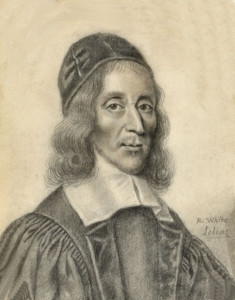 On 27 February, the church remembers George Herbert, an English priest of the early seventeenth century — and a poet who taught his verse to “rise harmoniously” on the wings of prayer.
On 27 February, the church remembers George Herbert, an English priest of the early seventeenth century — and a poet who taught his verse to “rise harmoniously” on the wings of prayer.
Born in 1593, he became a young man of brilliant promise, high-minded and proud — especially in his religion. He was convinced that God had chosen him for a great purpose, to instruct kings and princes in godly rule. But in a hard inner struggle, in prayers full of lament and anger, Herbert learned to question his ambitions. He came to realize, “Perhaps great places and [God’s] praise/ Do not so well agree.” At the age of thirty-three he was ordained a deacon; four years later he accepted the rural parish of Bemerton, where he was made a priest and found peace in the service of God and his flock. But his ministry was cut off all too soon, for he died of tuberculosis in early 1633, just short of his fortieth birthday.
Herbert left a collection of poems which was later published as The Temple. These poems have nourished the spiritual life of untold generations; several have been set to music, and two have become very popular as hymns — “Let all the world in ev’ry corner sing” and “Come, my Way, my Truth, my Life.” Herbert especially loved to sing about the eucharist, which he saw as a banquet where the masterful courtesy of Christ bids us sit down and taste his meat, to acquire with Herbert himself “such a heart, whose pulse may be/ [God’s] praise.”
George Herbert’s career was not what he would have originally hoped it would be. But out of the disappointment of seemingly irrelevant grit of his parish ministry came a work that gilded what was to be a short life, The Temple. In this series of poems he invites us into God’s temple. The Temple as a whole dramatises our spiritual journeys.
God is the source of order, of all “musick” – ultimately the source of the perfected response offered back to God by humans. Only the indwelling of God can turn “dust” to “gold”, and make a life, or a poem, acceptable as a sacrifice of praise that faithfully reflects the reality of God.
George Herbert wrote of letting God “touch and own” what we do. This has to be enabled by invitation (ours), fuelled by intimacy (prayer), dedicated by relinquishing (submission), set in a context of humility – all of which are themes particularly appropriate for the season of Lent.
Teach me, my God and King,
In all things thee to see;
And what I do in anything,
To do it as for thee.All may of thee partake;
Nothing can be so mean,
Which with this tincture, “for thy sake,”
Will not grow bright and clean.A servant with this clause
Makes drudgery divine:
Who sweeps a room, as for thy laws,
Makes that and the action fine.This is the famous stone
That turneth all to gold;
For that which God doth touch and own
Cannot for less be told.
George Herbert, 1633
Comments are closed.